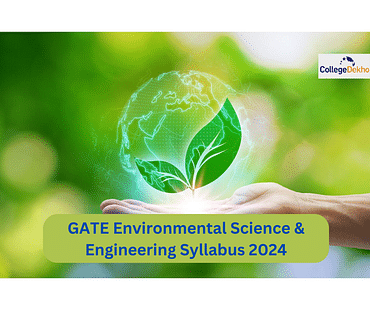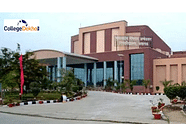Environmental Science & Engineering is one of the vital courses that applicants take to build their career after qualifying the GATE exam. Candidates can check the GATE Environmental Science & Engineering syllabus 2024 and previous year papers.
- GATE 2024 Syllabus of Environmental Science & Engineering - PDF …
- Section Wise Division of GATE 2024 Environmental Science & Engineering …
- Mathematics Foundation Syllabus for Environmental Science & Engineering
- Environmental Chemistry Syllabus of Environmental Science & Engineering
- Environmental Microbiology Section Syllabus
- Syllabus of Water Resources and Environmental Hydraulics
- Water & Wastewater Treatment and Management Section Environmental Science & …
- Environmental Science & Engineering Syllabus of Air and Noise Pollution …
- Environmental Science & Engineering Syllabus of Solid and Hazardous Waste …
- Global and Regional Environmental Issues Section Syllabus
- Environmental Management and Sustainable Development Syllabus of Environmental Science & …
- GATE Previous Year Question Papers of Environmental Science & Engineering
- Important Books for GATE Environmental Science & Engineering Course

GATE Environmental Science & Engineering (ES) Syllabus 2024: One of the sunshine courses from the engineering domain is that of environmental science and engineering. Upon clearing GATE 2024, candidates can contribute in various ways as an environmental science engineer. Candidates also get an opportunity to combine subjects and become an environmental civil engineer and ensure that houses and buildings are constructed safely thereby minimising the degradation effects on the environment. But, before going into the professional context, it becomes important for candidates to first successfully clear the GATE 2024 exam. To clear GATE 2024, the foremost thing that every candidate must do is to have a complete knowledge and understanding of the GATE 2024 environmental science & engineering syllabus.
Ongoing Event: GATE Application Form 2024 (Available)GATE 2024 Syllabus of Environmental Science & Engineering was released on the official website of IISc Bangalore. IISc Bangalore will be conducting the GATE 2024 exam on February 3, 4, 10 and 11 for all 30 courses. Candidates who will be appearing for the exam and are interested in making a future in the environment sector can check this article to know about the environmental science & engineering syllabus of GATE 2024 along with the previous year GATE question papers.
Related Articles:GATE 2024 Syllabus of Environmental Science & Engineering - PDF Download
Particulars | Details |
|---|---|
GATE Environmental Science & Engineering (EE) Syllabus 2024 PDF Download |
Section Wise Division of GATE 2024 Environmental Science & Engineering Syllabus
Candidates preparing themselves for the environmental science & engineering course must keep in mind the sections that consist of the environmental science & engineering syllabus of GATE 2024. All the nine sections of the syllabus are mentioned below.
- Mathematics Foundation
- Environmental Chemistry
- Environmental Microbiology
- Water Resources and Environmental Hydraulics
- Water & Wastewater Treatment and Management
- Air and Noise Pollution
- Solid and Hazardous Waste Management
- Global and Regional Environmental Issues
- Environmental Management and Sustainable Development
Mathematics Foundation Syllabus for Environmental Science & Engineering
Candidates can check the below table to know about the mathematics foundation syllabus of environmental science & engineering. Along with that, we have also mentioned for the assistance of every candidate the most vital topics from each section of the mathematics foundation syllabus in the below table.
Sections | All Topics | Important Topics |
|---|---|---|
Linear Algebra |
|
|
Calculus |
|
|
Differential Equations |
|
|
Probability & Statistics |
|
|
Environmental Chemistry Syllabus of Environmental Science & Engineering
Environmental chemistry forms an integral section of the environmental science & engineering course. Candidates can check the environmental chemistry syllabus of environmental science & engineering here in the table.
Sections | All Topics | Important Topics |
|---|---|---|
Fundamentals of Environmental Chemistry |
Concentration and Activity
|
|
Principles of Water Chemistry |
|
|
Soil Chemistry |
|
|
Atmospheric Chemistry |
|
|
Environmental Microbiology Section Syllabus
The section environmental microbiology comprises the following topics mentioned in the below table.
Sections | All Topics | Important Topics |
|---|---|---|
Prokaryotic and Eukaryotic Microorganisms |
|
|
Cell Chemistry and Cell Biology |
|
Polysaccharides
|
Microbial Metabolism |
|
|
Growth and Control of Microorganisms |
|
|
Microbiology and Health |
|
|
Syllabus of Water Resources and Environmental Hydraulics
Environmental science and engineering syllabus of water resources and environmental hydraulics is mentioned below.
Sections | All Topics | Important Topics |
|---|---|---|
Global Water Resources |
|
|
Surface Water Resources |
|
|
Groundwater Resources |
|
|
Environmental Hydraulics |
|
|
Water & Wastewater Treatment and Management Section Environmental Science & Engineering Syllabus
Candidates can check the water & wastewater treatment and management section of the environmental science & engineering syllabus here in the below table.
Section | All Topics | Important Topics |
|---|---|---|
Water & Wastewater Treatment and Management |
|
|
Environmental Science & Engineering Syllabus of Air and Noise Pollution Section
The air and noise pollution section of the environmental science & engineering course comprises the below mentioned syllabus and important topics.
Sections | All Topics | Important Topics |
|---|---|---|
Air Pollution |
|
|
Particulate Pollutants |
|
|
Gaseous Pollutants |
|
|
|
| |
Air Quality Management |
|
|
Noise Pollution |
|
|
Environmental Science & Engineering Syllabus of Solid and Hazardous Waste Management Section
Candidates can check the detailed syllabus and important topics here in the below table.
Sections | All Topics | Important Topics |
|---|---|---|
| Rules and Regulations for Solid Waste Management in India | |
Municipal Solid Waste Management | Sources, Generation, Characteristics, Collection and Transportation, Waste Processing And Disposal (Including Reuse Options, Biological Methods, Energy Recovery Processes and Landfilling). | |
Hazardous Waste Management |
| Treatment and Disposal |
Soil Contamination and Leaching of Contaminants into Groundwater | ||
| Waste Management Practices Including Storage, Collection and Transfer |
Global and Regional Environmental Issues Section Syllabus
The section on global and regional environmental issues comprises the following topics mentioned in the below table.
Sections | All Topics | Important Topics |
|---|---|---|
Global Effects of Air Pollution | Greenhouse Gases, Global Warming, Climate Change, Urban Heat Islands, Acid Rain, Ozone Hole | Greenhouse Gases, Global Warming, Climate Change, Ozone Hole |
|
|
Environmental Management and Sustainable Development Syllabus of Environmental Science & Engineering
Environmental management and sustainable development form an important section of the environmental science & engineering course. Candidates can check the environmental management and sustainable development syllabus of environmental science & engineering here in the table.
Sections | All Topics | Important Topics |
|---|---|---|
|
| |
Environmental Law and Policy |
|
|
|
| |
|
|
GATE Previous Year Question Papers of Environmental Science & Engineering
Candidates who are preparing for GATE 2024 must check the environmental science & engineering course previous year question papers given in the below table.
Year | Question Paper | Answer Key |
|---|---|---|
2023 | TBU | |
2022 | ||
2021 |
Also Read:
Important Books for GATE Environmental Science & Engineering Course
Students can check the list of books to cover environmental science & engineering syllabus of GATE 2024.
Topic | Name of the Books | Publication / Name of the Author |
|---|---|---|
Environmental Chemistry | Fundamentals of Environmental Chemistry | Manahan, S.E. |
Chemistry for Environmental Engineering | Swayer, C.N., McCarty, C.N. and Parkin, G.F | |
Environmental Microbiology | Environmental Microbiology, 2nd Edition | Maier, R.M., Pepper, I.L., Gerba C.P. |
Brock Biology of Microorganisms | Michael T. Madigan, John M. Martinko | |
Water Resources | Engineering Hydrology | K. Subramanya |
Environmental Hydraulics | Fluid Mechanics: Fundamentals and Applications | John Cimbala and Yunus Cengel |
Hydraulics & Fluid Mechanics | Modi and Seth | |
Fox and McDonald’s Introduction to Fluid Mechanics | Philip J. Pritchard | |
Water & Waste water Treatment and Management | Water Supply Engineering | SK Garg |
Waste Water Engineering | Metcalf and Eddy | |
Air and Noise Pollution | Environmental Pollution Control Engineering | C.S.Rao |
Fundamentals of Air Pollution Engineering | Flagan, R.C., and Seinfeld, J.H. | |
Air Pollution Control Engineering | N. de Nevers | |
Solid and Hazardous Waste Management | Sewage Waste Disposal and Air Pollution Engineering | SK Garg |
Solid Waste Management: Principles and Practice | Diganta Bhusan Das and Ramesha Chandrappa | |
Environmental Management and Sustainable Development | Principles of Environmental Science | Cunningham W.P. and Cunningham M.A. |
With the help of this article, applicants may gain a thorough understanding of the environmental science and engineering syllabus for GATE 2024 as well as learn about the key themes for each part that make up the environmental science and engineering syllabus for GATE 2024.
Are you feeling lost and unsure about what career path to take after completing 12th standard?
Say goodbye to confusion and hello to a bright future!

GATE Previous Year Question Paper
Was this article helpful?



















Similar Articles
CSAB NIT Jalandhar Expected Cutoff 2025: Detailed Analysis of Previous Years' Cutoff for all Courses and Categories
CSAB NIT Agartala Expected Cutoff 2025: Detailed Analysis of Previous Years' Cutoff for all Courses and Categories
CSAB NIT Cutoff 2025: Branch Wise Expected Closing Ranks
How to Apply for CSAB Special Round 2025?
Who is eligible for the CSAB special round counselling 2025?
Maharashtra Direct Second Year Engineering (DSE) Admission 2025: Registration (Started), Dates, Merit List, Option Form, Seat Allotment